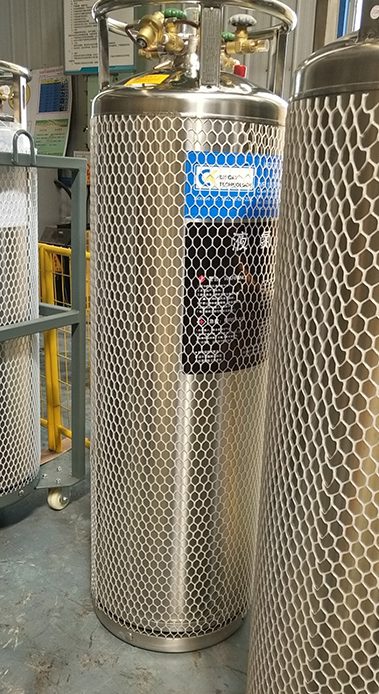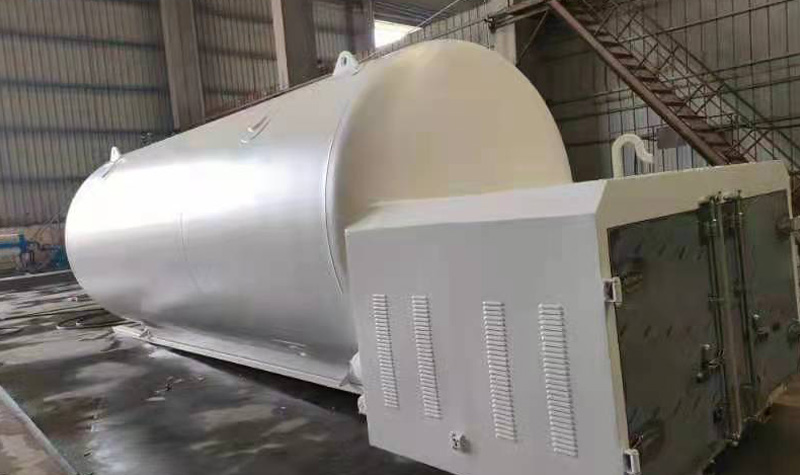1. Metal processing: nitrogen source for heat treatment such as bright quenching, bright annealing, nitriding, nitrocarburizing, and soft carbonization; maintenance gas during welding and powder metallurgy sintering, etc.
2. Chemical synthesis: Nitrogen is mainly used to synthesize ammonia, and the reaction formula is N2+3H2=2NH3 (conditions are high pressure, high temperature, and catalyst. The reaction is reversible) or synthetic fiber (nylon, acrylic), synthetic resin, synthetic rubber, etc. important raw material. Nitrogen is a nutrient element that is also used to make fertilizers. For example: ammonium bicarbonate NH4HCO3, ammonium chloride NH4Cl, ammonium nitrate NH4NO3 and so on.
3. Electronics industry: Nitrogen gas source from nitrogen gas cylinder or dewar cylinder for large-scale integrated circuits, color TV picture tubes, TV and radio components and semiconductor components.
4. Metallurgical industry: maintenance gas for continuous casting, continuous rolling, and steel annealing; combined nitrogen blowing on the top and bottom of converter steelmaking, sealing of converter steelmaking, sealing of blast furnace top, gas for blowing pulverized coal in blast furnace ironmaking, etc.
5. Food preservation: Nitrogen-filled storage and preservation of grain, fruits, vegetables, etc.; Nitrogen-filled fresh-keeping packaging for meat, cheese, mustard, tea and coffee; Nitrogen-filled and oxygen-exhausting preservation of fruit juice, raw oil, and jam; Purification and cover-up of bottled wine, etc.
6. Pharmaceutical industry: Nitrogen-filled storage and preservation of traditional Chinese medicine (such as ginseng); nitrogen-filled western medicine injection; nitrogen-filled storage and containers; gas source for pneumatic conveying of medicinal materials, etc.
7. Chemical industry: maintenance gas in replacement, cleaning, sealing, leak detection, and dry coke quenching; gas used in catalyst regeneration, petroleum fractionation, and chemical fiber production.
8. Chemical fertilizer industry: nitrogen fertilizer raw materials; replacement, sealing, cleaning, maintenance of catalyst and other gas.

9. Plastic industry: pneumatic transmission of plastic particles; anti-oxidation in plastic consumption and storage, etc.
10. Rubber industry: rubber packaging and storage; tire production, etc.
11. Glass industry: maintenance gas in the production process of float glass.
12. Petroleum industry: Nitrogen-filled purification of storage, containers, catalytic cracking towers, pipelines, etc.; air pressure leak test of pipeline systems, etc.
13. Offshore oil development; gas coverage of platforms in offshore oil exploitation, inertization of oil, cryogenic storage tanks, containers, etc. for pressure injection nitrogen gas exploitation.
14. Storage: To avoid fire and explosion of combustibles in cellars and warehouses, fill them with nitrogen.
15. Sea transportation: gas for tanker cleaning and maintenance.
16. Aerospace technology: rocket fuel booster, launch pad replacement gas and safety maintenance gas, astronaut control gas, space simulation room, cleaning gas for aircraft fuel pipelines, etc.
17. Application in petroleum, natural gas and coal mining industry: Filling nitrogen into the oil well can not only increase the pressure in the well and increase the oil production, but also can be used as a cushion in the measurement of the drill pipe, completely avoiding mud in the well Possibility of pressure crushing the lower test tube column. In addition, nitrogen is also used in downhole operations such as acidizing, fracturing, hydraulic nozzles, and hydraulic packer setting. Filling the natural gas with nitrogen can reduce the calorific value. When the crude oil is changed to the pipeline, liquid nitrogen can be used to burn the materials at both ends to solidify and block them.
18. Others:
A. Nitrogen-filling and oxygen-exhausting paints and coatings to avoid oil-dry aggregation; oil and natural gas storage tanks, containers, and transport pipelines for nitrogen-filling and oxygen-exhausting, etc.
B. Car tires
(1) Improve the stability and comfort of tire driving;
(2) Avoid tire blowout and run-over due to lack of air;
(3) Extend the service life of tires;
(4) Reduce fuel consumption and maintain the environment.
In short, nitrogen is becoming more and more popular in protection and safety. The demand for nitrogen is increasing with the development and attention of the industry. With the rapid development of our country’s economic construction, the amount of nitrogen used will also increase rapidly.


